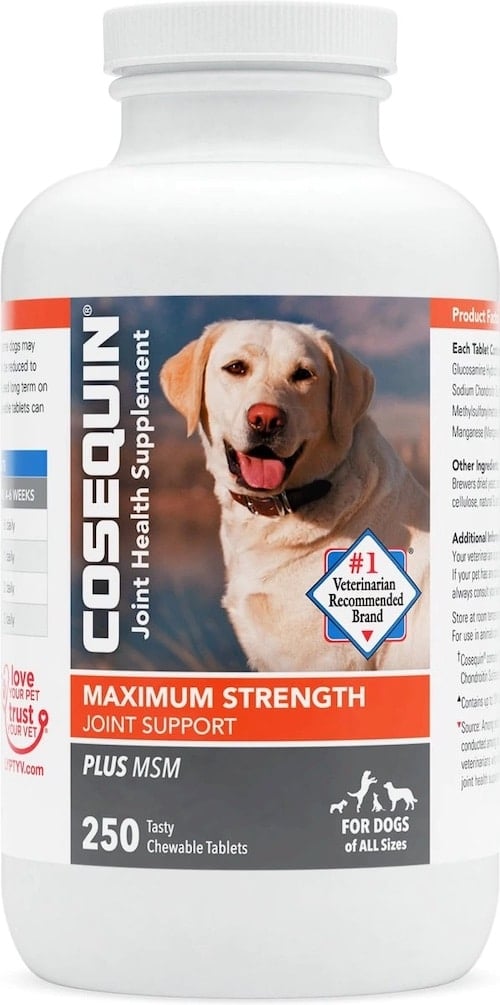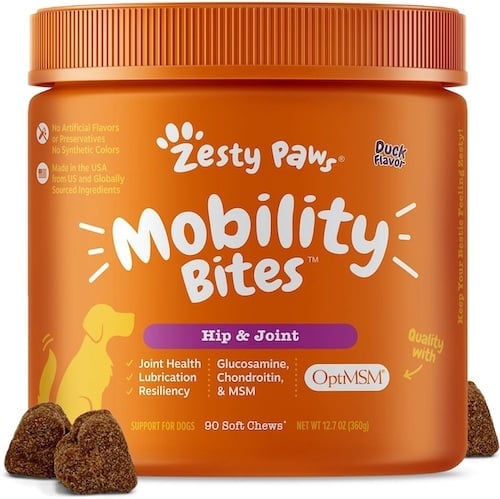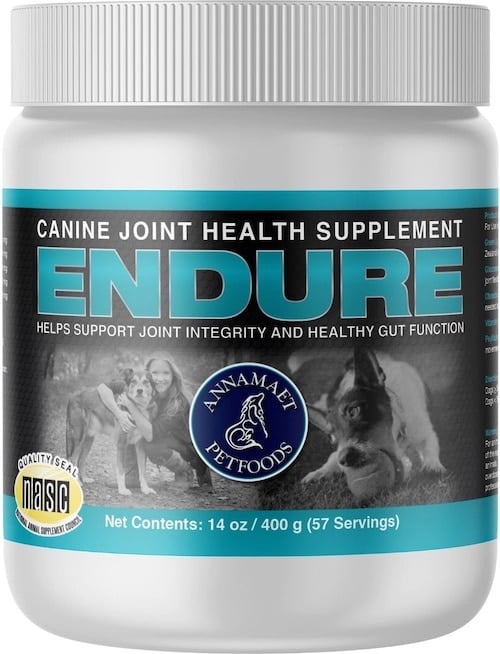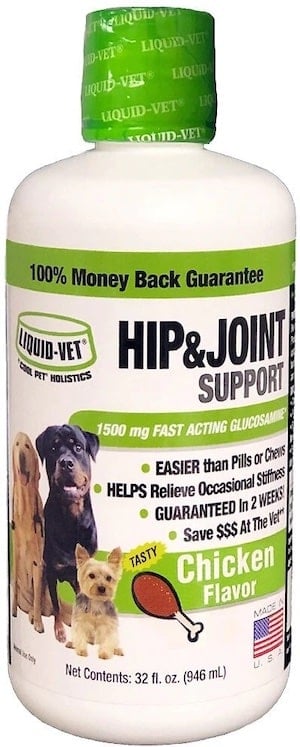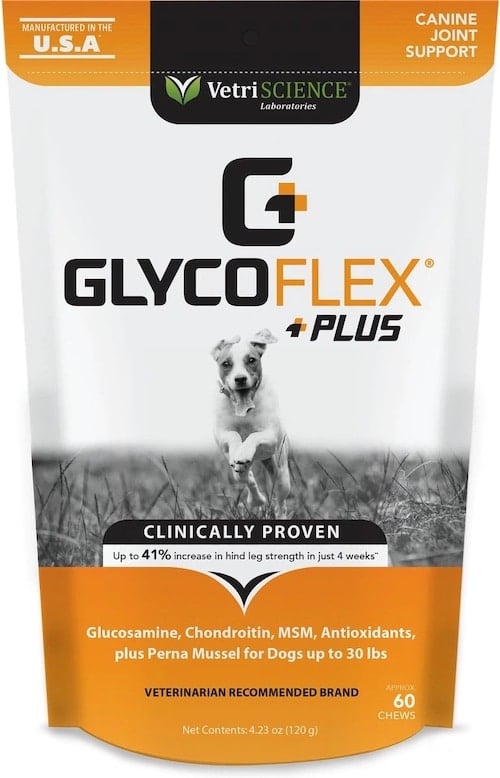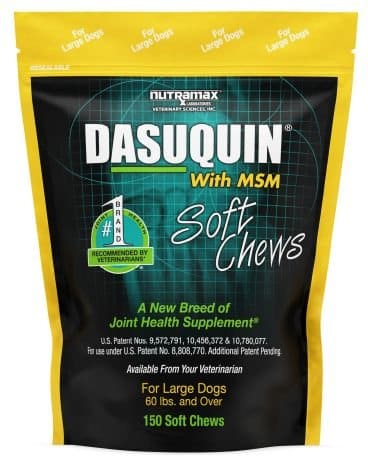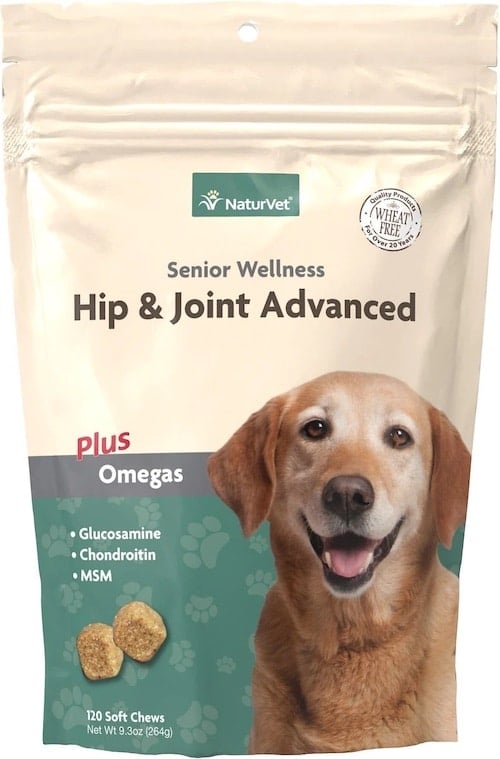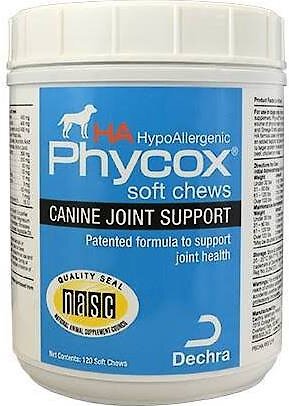- This post contains affiliate links. Read more here.
- Not a substitute for professional veterinary help.
Joints are a vital part of our dogs’ skeletal systems. They allow our furry buddies to walk, run, leap, and play fetch. Unfortunately, some dogs face a higher risk of developing joint problems because of their breed, size, or activity level. Dog joint supplements are one way that pet parents can prevent issues—or alleviate discomfort in dogs who already have joint pain.
“The aim of joint supplements is to minimize joint inflammation and to prevent cartilage breakdown,” says Linda Simon, a veterinary surgeon and consultant for FiveBarks. “They should help to keep joints supple and mobile, and they should reduce the incidence of arthritis,” she adds.
While they’re not a magical cure-all, dog joint supplements have been shown to decrease pain and stiffness, reduce injury risk, and slow down the degeneration of joints. All the same, supplements are not regulated by the FDA yet, so pet parents should do their research before choosing one. Not sure where to start? Hop down to our experts’ recommendations on ingredients to look for.
Joint pain supplements come in capsules, chewable tablets, powders, and liquids—you can choose whatever format is most palatable to your dog. It’s also critical to choose a joint supplement that’s specific to dogs, not one intended for humans. And as always, get the all-clear from your veterinarian before adding anything new to your dog’s diet.
- Best Overall: Nutramax Cosequin Maximum Strength Tablets
- Best Soft Chew: Zesty Paws Mobility Bites
- Best Powder: Anamaet Endure Hip and Joint Powder
- Best Liquid: Liquid-Vet Hip and Joint Support
- Best for Small Dogs: VetriScience GlycoFlex Plus Soft Chews
- Best for Large Dogs: Nutramax Dasuquin with MSM Joint Supplement
- Best for Seniors: NaturVet Senior Wellness Hip & Joint Advanced
- Best for Dogs with Allergies: Phycox Hypoallergenic Canine Joint Support
Best Overall: Nutramax Cosequin Maximum Strength Tablets
Cosequin is one of the leading dog joint supplements, and Nutramax is the #1 brand recommended by veterinarians. The scientifically researched formula contains glucosamine, chondroitin sulfate, and MSM—all of which help maintain your dog’s cartilage and connective tissue. A lot of pet parents report improvements in their dog’s mobility and energy after taking Cosequin for a few weeks.
What we like:
- Nutramax is a top veterinarian-recommended brand
- Contains glucosamine, chondroitin sulfate, and MSM
- For dogs of all sizes
- Also available in capsules and soft chews
Things to consider:
- Some dogs don’t like the taste, so you may need to hide the tablets in food
- Not for puppies
Find on Chewy Find on Amazon Find on Petco Find on Walmart
Best Soft Chews: Zesty Paws Mobility Chews
Soft chews are popular with seniors, puppies with baby teeth, and dogs with dental problems. They’re also a smart choice for picky eaters since they tend to be more palatable than a tablet—more like a treat than a pill, really.
These duck-flavored soft chews support hip and joint health with glucosamine HCl (for lubrication and flexibility of connective tissue), chondroitin sulfate (for healthy cartilage), and OptiMSM—a premium form of MSM engineered to help your dog flex her muscles.
For an extra health boost, Zesty Paws include Vitamins C and E. You’ll also find kelp, which is packed with vitamins, minerals, and amino acids.
What we like:
- Vitamins C and E for added antioxidant support
- Natural flavors derived from oregano, flaxseed, and plum
- Also available in bacon flavor
- No artificial flavors, colors, or preservatives
- No corn, wheat, or soy
Find on Chewy Find on Amazon Find on PetSmart Find on Walmart
Best Powder: Anamaet Endure Hip and Joint Powder
Not all dogs will be happy to swallow pills or chewable tablets. And some clever pups can’t be fooled with a spoonful of peanut butter—no matter how tempting. In these cases, a powder supplement that can be mixed into your dog’s food may have more success.
This powder by Endure is designed to maintain healthy joints and gut function. Along with glucosamine and chondroitin sulfate, it contains green-lipped mussel: an edible shellfish known for its anti-inflammatory properties. Endure also incorporates psyllium, a soluble fiber for better gut health. The majority of users report noticeable differences after using the product for a week or two.
What we like:
- Certified by the National Animal Supplement Council (NASC)
- Contains vitamin C
- Easy to add to kibble
- Safe for all ages and sizes
Things to consider:
- Fairly expensive
Best Liquid: Liquid-Vet Hip and Joint Support
For some dogs, a liquid is easier to ingest than a pill or powder. You can also add liquid supplements to dry food for a moist treat, which tends to appeal to picky eaters or dogs who don’t like tablets or chews.
Each dose of Liquid-Vet contains glucosamine, MSM, hyaluronic acid, and chondroitin. The company says dog parents can expect to see improvements in their pet’s movement and energy in about two weeks.
What we like:
- Manufactured in the U.S. with U.S.-sourced ingredients
- Flavors include chicken, pot roast, and bacon
- The company guarantees results in two weeks—or your money back
Things to consider:
- For freshness, LiquidVet should be stored in the fridge
Find on Chewy Find on Amazon Find on Tractor Supply
Best for Small Dogs: VetriScience GlycoFlex Plus Soft Chews
Designed for smaller breeds, these GlycoFlex chews are crafted for dogs up to 30 pounds and have been clinically proven to increase hind leg strength by up to 41% in four weeks. They include glucosamine from shrimp and crabs, green-lipped mussel, MSM, chondroitin sulfate, manganese, and vitamins E and C. You’ll also find DMG, which is said to lower lactic acid build-up and support your pup’s stamina.
What we like:
- Veterinarian-recommended brand
- Clinically proven to be effective
- Safe for all ages: puppies, adults, and senior dogs
- Also available as tablets
Things to consider:
- Contains some processed fillers, like maltodextrin and glycerine
Find on Chewy Find on Amazon Find on Petco Find on Walmart
Best for Large Dogs: Nutramax Dasuquin with MSM Joint Supplement
Large dogs, unfortunately, have a higher risk of developing joint problems like hip dysplasia and arthritis. So getting them started on a joint supplement early on can help prevent issues later down the road.
Dasuquin is made for bigger dogs over 60 pounds. Not all dogs find the taste agreeable. But if your loveable giant likes them, these soft chews deliver glucosamine, chondroitin sulfate, MSM, and Boswellia serrate (a plant-based extract known for its anti-inflammatory properties). You’ll also find green tea extract as well as avocado/soybean unsaponifiables—natural extracts that support joint function.
What we like:
- Ingredients are high quality and well-researched
- Contains healthy components sourced from avocado, soybeans, and green tea
- Available as soft chews or chewable tablets
Things to consider:
- Some dogs don’t like the taste
- Expensive
Find on Chewy Find on Petco Find on Walmart
Best for Seniors: NaturVet Senior Wellness Hip & Joint Advanced
Specifically for older dogs, this formula from NaturVet contains fish oil, salmon oil, and flaxseed to deliver Omega-3 and Omega-6 fatty acids. There’s also yucca, a natural ingredient with anti-inflammatory and anti-arthritic properties.
We like that NaturVet prioritizes the safety and integrity of their ingredients, conducting in-house lab tests for issues like salmonella contamination. And, after each batch is made, the supplements are not released for purchase until tested again by the company’s Quality Control Department.
What we like:
- Formulated by veterinarians
- Made in an FDA-approved facility
- Includes vitamins C and E
- Designed for seniors but can be given to any dog over the age of one
- More affordable than many other joint supplement brands
Find on Chewy Find on Amazon Find on Walmart
Best for Dogs with Allergies: Phycox Hypoallergenic Canine Joint Support
If your dog has an allergy or a sensitivity to certain ingredients, you might be limited when it comes to supplements. Phycox HA leaves out grain and animal protein: two of the more common allergens in dogs. Instead, this formula uses hydrolyzed vegetable protein derived from soybeans for its anti-inflammatory effects.
This dog joint supplement also contains phycocyanin—a natural antioxidant, which is derived from blue-green algae and has been clinically proven to inhibit inflammation.
What we like:
- Also good for dogs on a limited-ingredient diet
- Includes omega fatty acids and antioxidants
- Contains turmeric and selenium
- Available in a regular, non-hypoallergenic formula, too
Things to consider:
- Some pet parents mention a lack of safety seal
Find on Chewy Find on Amazon Find on Walmart
Ingredients in Dog Joint Supplements
A product’s ingredients should be the top thing to consider, according to Melissa M. Brock, a board-certified veterinarian at Pango Pets.
“The first thing to look for is glucosamine, which is a type of amino sugar that acts as a lubricant in joints,” Brock tells Rover. “Glucosamine is one of the most important nutrients for helping your dog stay healthy and pain-free as they age.”
Another ingredient Dr. Brock advises pet parents to look for is chondroitin sulfate. “Like glucosamine, chondroitin sulfate has anti-inflammatory properties that help keep your dog’s joints moving smoothly—even when they have arthritis or other joint issues,” she says.
Other ingredients to look for in dog joint supplements include:
- MSM (methylsulfonylmethane): another amino sugar that supports healthy collagen production
- Omega fatty acids (like EPA and DHA): known to reduce inflammation in the body
- Vitamins C and E: antioxidants that can help reduce oxidative stress on the entire body—including the joints
“All of these nutrients work together synergistically to support overall health in your dog’s joints—and that means you can expect better mobility,” explains Dr. Brock.
Alternatives to Joint Supplements
If you find the cost of supplements daunting (or your dog finds the taste disagreeable), there are alternative methods to keep your dog’s joints in good shape.
First, keep your dog active. Go for long sniffy walks, play a game of tug, or engage them in dog sports—whatever they like that keeps them moving. “This will help them maintain healthy muscles and bones, which will help prevent injuries and arthritis later on in life,” says Dr. Brock.
Incorporating enriched food (think fresh salmon, sardines, and other rich Omega 3 fatty acids), can also help you target and prevent joint disease and pain. And, because extra pounds add strain to hardworking joints, managing your dog’s weight is crucial in helping them stay healthy.
How We Chose
The supplements featured here were selected based on a combination of our own hands-on testing, a comprehensive look at customer reviews across a wide variety of retail platforms, and interviews with veterinary experts. We prioritized supplements from veterinary-recommended brands, looking for effective ingredients and ease of serving. We’re also guided by the experience of living and playing alongside our own much-loved and strongly opinionated dogs, who are never stingy with their feedback.
Further Reading
- How to Give Pills to Your Pet
- All About Vitamin Supplements for Dogs and When to Use Them
- Useful Items for Dogs at Risk of Hip Dysplasia
- Healthy Oils for Dogs to Give Your Dog’s Coat (and Brain) a Boost
- Got Allergies? Exploring Hypoallergenic Dog Food

